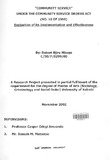| dc.description.abstract | This study is an evaluation of the implementation and effectiveness of the "Community Service Orders (CSO)" under the Community Service Orders act No 10 of 1998. The programme is recent and this study is a preliminary one. Since it is growing at a very high rate, community service is an important factor to Kenya's criminal justice improvement. This study sought to answer the following questions: -
a) Whether the CSO programme has been effectively implemented and whether all the structures set up by the Community Service Orders Act have been put in place.
b) Whether the programme has made positive contribution to Kenya's Penal System particularly in reducing the prison population in Kenya.
c) What strengths and weaknesses the programme has, and what measures would make it more effective.
The primary function of any prison is deterrence, reformation and rehabilitation of offenders. It is expected that those who go to prison come out better citizens. This can only be achieved by ensuring that those who go to prison come out as better citizens. However, most of the prisons, especially in the developing countries are overcrowded. The number of those going to prisons is rapidly increasing and the problem of overcrowding is getting worse. Overcrowding in prisons is a common phenomenon experienced in many countries of the world today. According to observers, overcrowding is more than a problem in some countries as it has reached crisis levels and is interfering with the effective administration of criminal justice. Prison overcrowding brings with it a host of serious problems. It causes severe strain on the essential services, resulting in serious health hazards and disruption of penal reformation and the separation of different categories of offenders becomes difficult to achieve. Prison overcrowding contributes to additional pressure and strain on staff.
Community Service Orders have greatly assisted in solving this problem of overcrowding because petty offenders are dealt with from outside the prison. The issue of alternative
sentences is vigorously being debated in developing countries. Many scholars are of the view that the prison institution has failed in reducing crime. Many developing countries are finding it difficult to manage their prisons. Over populated penal establishments can often only provide inadequate conditions for inmates, both physically and psychologically. Prisoners have to be detained for long periods in remand and prisons national statutory texts, which govern them.
Community Service provides an alternative to imprisonment and is particularly beneficial to the first and youthful offenders. It is an alternative sentencing approach, which gives the offender an opportunity to reflect on his crime and its effect on the society. The offender is kept out of prison and does work which is directly beneficial to the society. There is now the international consensus that imprisonment does not reduce the rate of crime. On the contrary, it has been shown that persons who are sent to prison for any length of time are likely to re-offend as compared to those who are punished otherwise.
It is on this basis, that it is crucial to evaluate the programme from the time it started to the end of the year 2001. We have looked at the data on referrals, placements, and the caseload. Data was collected by use of a questionnaire, which mainly targeted the community service officers. Data was further analyzed and presented by use of graphs to evaluate the position of the programme. The data assisted us to come up with findings and recommendations, which are stated in our chapters four and five of the study. | en |

